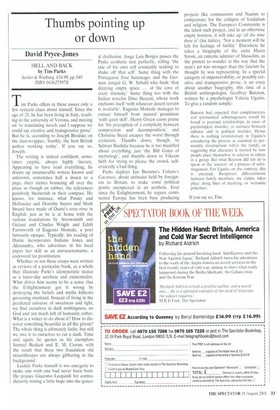Thumbs pointing up or down
David Pryce-Jones
HELL AND BACK by Tim Parks Secker & Warburg, £16.99, pp.340 ISBN 043627597X Tim Parks offers in these essays only a few reticent clues about himself. Since the age of 25, he has been living in Italy, teaching in the university of Verona, and moving on 'to translating novels and I suppose we could say creative and transgressive prose'. But he is, according to Joseph Brodsky on the dust-wrapper, 'frankly, the best British author working today'. If you say so, Joseph.
The writing is indeed confident, sometimes cryptic, always highly literary. Appearing to have read everything, he drums up innumerable writers known and unknown, sometimes half a dozen to a page, their names bouncing all over the place as though on rubber, the references positively Steinerish in their compass. He knows, for instance, what Pinsky and Hollander and Dorothy Sayers and Mark Strand have made of Dante's terza rima in English, just as he is at home with the various translations by Arrowsmith and Galassi and Charles Wright and Edith Farnsworth of Eugenio Montale, a poet famously opaque. Typically, his reading of Dante incorporates Indiana Jones and Alessandra, who advertises in his local paper her skill as an astrocartomante, a codeword for prostitution.
Whether or not these essays were written as reviews of a particular book, as a whole they illustrate Parks's idiosyncratic stance as a latter-day aesthete and existentialist. What drives him seems to be a sense that the Enlightenment got it wrong by destroying the beliefs and myths hitherto governing mankind. Instead of living in the predicted universe of sweetness and light, we find ourselves in dark nothingness, no God and not much left of humanity either. What is a writer to do about it? How to discover something beautiful in all the gloom? The whole thing is ultimately futile, but still we owe it to ourselves to cut a dash. Time and again, he quotes as his exemplars Samuel Beckett and E. M. Cioran, with the result that these two fraudulent old misanthropes are always gibbering in the background.
Luckily Parks himself is too energetic to make one wish one had never been born. He praises Giacomo Leopardi for contradictorily mixing a little hope into the gener al disillusion. Jorge Luis Borges passes the Parks aesthetic test perfectly, telling `the tale of his own self constantly seeking to shake off that self. Same thing with the Portuguese Jose Saramago, and the German emigre G. W. Sebald who finds 'that dizzying empty space ... at the core of every intensity.' Same thing too with the Italian novelist Dino Buzzati, whose work enchants itself `with whatever desert terrain is available'. Eugenio Montale manages to extract himself from natural pessimism 'with quiet skill'. Henry Green earns praise for 'his perception of a complicity between composition and decomposition,' and Christina Stead escapes the worst through eroticism. Thumbs down, though, to Salman Rushdie because he is too muddled about everything, just 'the Bill Gates of mythology', and thumbs down to Vikram Seth for trying to please the crowd, selfevidently a had thing.
Parks deploys Ian Buruma's Voltaire's Coconuts, about attitudes held by foreigners to Britain, to make some political points unexpected in an aesthete. Ever since the Enlightenment, he argues, continental Europe has been busy producing projects like communism and Nazism to compensate for the collapse of feudalism and religion. The European Community is the latest such project, and in an otherwise empty horizon, it will take up 'all the time there is' (his italics). 'Not a moment will be left for feelings of futility.' Elsewhere he takes a biography of the artist Mario Sironi, an extreme admirer of Mussolini, as the pretext to wonder at the way that the man's art was stronger than the fascism he thought he was representing. In a special category of impenetrability, or possibly creative and transgressive prose, is an essay about another biography, this time of a British anthropologist. Geoffrey Bateson, written by a psychologist Valeria Ugazio. To give a random sample:
Bateson had expected that complementary and symmetrical schismogenesis would be found in personal relationships, in cases of psychological disorder, in contacts between cultures and in political rivalries. Hence there is nothing revolutionary in Ugazio's considering the process as essential to personality development within the family, or suggesting that character is formed by how people place themselves in relation to others in a group. But what Bateson did not do is speak of the 'content of a process of schismogenesis. For Llazio, on the contrary, this is essential. Reciprocal differentiation between family members, she claims, takes place along lines of meaning, or 'semantic polarities'.
If you say so, Tim.


























































 Previous page
Previous page